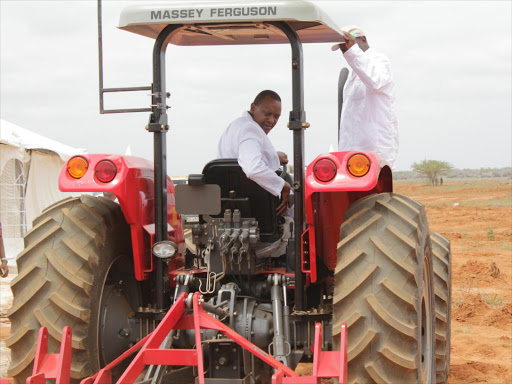 |
| HE Uhuru Kenyatta. Photo from Thenewhumanitarian.com |
Farm mechanization in Africa is indispensable in the wake of infectious diseases like COID-19.
In my previous article entitled "COVID-19 exposes African agriculture by targeting the elderly who are the main source of agricultural labor", I discussed how the COVID-19 pandemic poses a serious risk
to Africa’s agricultural workforce, which is aged around 60 years. In this
article, I elicit some reflections around the recurrent disease outbreaks in
Africa, and their effects on agriculture.
Data available on Kenya's agriculture indicates that:
- Agriculture
directly employs more than 40% of Kenya’s population,
- Degree
of farm mechanization stands at 30%, predominately land preparation.
- 20%
of farm activities rely on draught animals, and
- 50%
of farm activities depend on human muscles. Human muscle power is provided by agricultural wage earners, who are paid daily. They move from farm to farm in search of work, either on a daily or weekly basis.
The above description highlights that Kenya’s farming lies on the
shoulders of human muscles. Therefore, an outbreak of human diseases could have
dire consequences on agriculture. For example, it’s widely mentioned that the
high prevalence of HIV/AIDS has been a big impediment to farmers' productivity
in Africa.
In Africa, it is common to hear of disease outbreaks. In 2014 it
was Ebola, today it is COVID-19, another it is day cholera or malaria, and
tomorrow we never know.
Why farm mechanization in Africa is indispensable in the post-COVID-19 era
If social distancing and minimized movements become the new normal,
how readily can agriculture adapt given that thousands of people work on the
farms?
In the corporate world, organizations that possess enabling
infrastructure are already implementing strategies such as remote working,
working in shifts, automation, etc, to minimize human to human contact.
Is Africa’s agriculture well enabled to implement strategies that
reduce human interactions without affecting efficiency?
Mechanization is one of such enablers, however, Africa is crawling
behind.
The COVID-19 pandemic should be a reminder that farm
mechanization is still a priority. Transition from muscles to the engine will
reduce the vulnerability of the agricultural sector during the COVID-19
pandemic and in future disease outbreaks.
 |
| Photo courtesy of Joseph Wambugu |
Development partners,
Governments

10 Comments
Interesting piece there CGC!
ReplyDeleteAgric mechanization is the game changer for African agriculture.
Those providing manual labour should climb up the ladder on the value chain i.e processing so as to give space for mechanization.
Thank you. 100% I agree. Mechanization shall set people free.
DeleteAmazing work WF. It's now evident that farmers will undergo a paradigm shift when it comes to changing from human muscle power to the use of machinery such as Massey Ferguson/Valtra/Fendt/Challenger name them. The drudgery commonly associated with human muscle power will reduce in near future, paving way for modern farming technologies. In the awakening of this, I am one passionate farmer focused on purchasing a Massey Ferguson and help farmers access hire mechanization services with ease.
ReplyDeleteInteresting. Contact me in the inbox please. I am interested to know more about your work.
DeleteThank
Very informative and mind provoking article Wambugu. A challenge to think about for stakeholders in the agricultural space
ReplyDeleteSure Dedan. I hope they will read, and give feedback :)
DeleteWonderful insight. It's the duty of the relevant stakeholders then to consider how best to mechanize our agriculture, considering that the majority of farmers are smallholders and may not easily acquire machinery. Maybe the government to think of taking up the duty and providing mechanized services to farmers at subsidized prices.
ReplyDeleteRight. Unfortunately the decision to mechanize or not does not (always) rely on farmers. Strategic decisions made at macro or meso levels by sector stakeholders greatly influence what farmers do with mechanization.
DeleteVery essential information here. We need such guidelines as individuals and as a country
ReplyDeleteSure. Thank you!
DeletePost a Comment